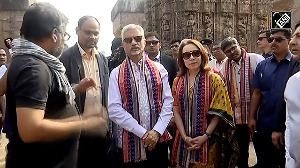 India wants peace with Pakistan but there can be no compromise with its own territorial integrity, President Pranab Mukherjee has said, while asserting that state-sponsored terrorism from across the border cannot be accepted.
India wants peace with Pakistan but there can be no compromise with its own territorial integrity, President Pranab Mukherjee has said, while asserting that state-sponsored terrorism from across the border cannot be accepted.
He also dismissed Pakistan's contention that "non-state actors" were behind the terror acts in India, saying they are not coming from heaven, but from territory under the control of the neighbouring country.
Mukherjee, who is on a four-day state visit to Belgium, reiterated that the terror infrastructure in Pakistan needs to be brought down.
"Terrorist activities must be curbed. And state-sponsored terrorism can never be accepted. Therefore, repeatedly we are saying, please dismantle the terrorist outfits which are located in your area," he said in an interview to Euronews.
Mukherjee said ‘non-state actors who perpetrate terrorism’ was a phrase used by Pakistan.
"It may not be. But non-state actors, that is the phrase they used, then I responded by saying that non-state actors are not coming from heaven. Non-state actors are coming from territory under your control. And not now, in 2004, Pakistan agreed that their territories will not be allowed to be used by forces inimical to India," he said.
He said India does not have any territorial ambitions and wants peace with its neighbours while maintaining its own territorial integrity.
"In 1971, when Indira Gandhi was the prime minister and Zulfikar Ali Bhutto was the prime minister of Pakistan, India entered into an agreement which is known as the Shimla
Agreement...91,000 imprisoned soldiers, prisoners of war, were returned," he said.
"This was just to show the goodwill that in our basic foreign policy we do not have any territorial ambition, we do not have any ambition to export our ideology to any country or we do not have any commercial interests," Mukherjee said.
The President stressed that no country can, however, compromise on its territorial integrity.
"We want to have good relations with our neighbours. When I was foreign minister, more than often I used to say that I can change my friends if I like but I cannot change my neighbours if I like. I shall have to accept the neighbour the way he is. He is my neighbour. Whether I like it or not does not matter. Therefore, it is for me to decide whether I live with my neighbour in tension or in peace. We opted for peace,” Mukherjee said.
"And we have good relations with Nawaz Sharif at the personal level also. But one point is to be understood. No country can compromise its territorial integrity. That is not possible," he said.
Talking about the forthcoming general elections in the country, the President said the people will "express their views" about "certain important programmes" like the Food Security Act, Rural Job Guarantee scheme and Right to Education among others.
The President said India is aiming to move towards an inclusive growth for its citizens.
"What I am talking about is that we want to achieve inclusive growth, and inclusive growth of course requires that there must be food, there must be education, there must be health and sanitation. We shall have to move for inclusive growth and inclusive growth could be achieved by providing food, education, health, sanitation because after all policy-makers of India are to take care of 1.2 billion plus people and it is a huge task. Therefore, our developmental model cannot be framed in the context of other countries' developmental model. It must be in the context of the socioeconomic conditions prevailing in India," he said.
He said the wave of a "charismatic" leader who could win elections is usually found "only when" the polls are over.
"Whether a leader is charismatic or not depends on whether he or she is able to catch the vote. Charisma is tested by them. Here I can tell you as a political activist that always we talk during the election of a wave or wind. But wave or wind can be found out only once it is over. When it is coming or when it is blowing, nobody can say where the wind is blowing or the wave is moving," he said.











 © 2025 Rediff.com -
© 2025 Rediff.com -